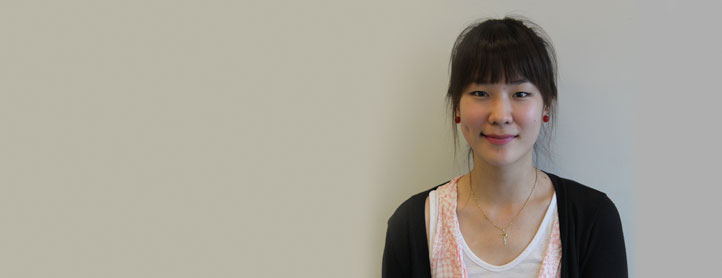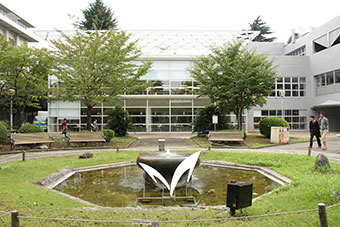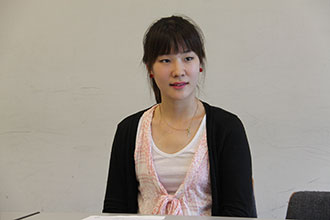
Kim Hae InSeoul, South Korea
|
School of Political Science and Economics |
1What made you want to come to Japan to study?

When I was in elementary school, I became intrigued with the beauty of the round shape of hiragana. Then, during a trip from Korea to Fukuoka and Kobe by boat with my family, I was touched by the attentive service and kindness of the Japanese people and became interested in Japan. That was the reason I decided I wanted to study in Japan. Additionally, my hometown Ichon is known as the Japanese quarter in Seoul, so I was surrounded by Japanese food and Japanese entertainment information. I think that was the reason I acquired a strong affinity toward Japan. Meiji University is well known in Korea as well, and my parents and relatives recommended it to me. That was why I chose Meiji University.
2What are you currently studying?
Because my hometown is an area where there are more foreigners than in other parts of Korea, I want to be involved in work that helps support the lives of foreigners, who are still a minority in Korea. In the future, when I go back to my home country, I hope to work in administrative services as a civil servant. That is why I chose the Department of Local Governance, which is an unusual department at Korean universities. I am currently a senior, and I am in Professor Philip Zitowitz’s seminar, learning about American culture. I am planning to do a comparative study on the theme of multiculturalism seen in movies, comparing multiculturalism depicted in American movies in the 1960s and 1970s and multiculturalism today.

3What differences do you perceive in Japanese and Korean universities?
At Japanese universities, if you take a leave of absence, you need to pay the university a special fee. In Korea, however—perhaps influenced by military service—there is no special fee to pay for taking a leave of absence. Therefore, many students take leaves of absence to aggressively make efforts to overcome the tough employment situation, such as study at a language school overseas to master a foreign language, experience an internship overseas, or concentrate on studying for a qualification.
4Have you made many Japanese friends?
When I first enrolled at Meiji University, I was the only international student in my class. I had a lot of concerns such as living for the first time overseas away from my parents and about my Japanese language skills. But all of my Japanese classmates were so kind, and making friends I could rely on in Japan became a huge source of support for me in my life overseas. During long breaks, I visit the homes of classmates who are from other parts of Japan or invite my classmates to visit me at my home in Korea.
5Where is your favorite place in Meiji University?
Izumi Campus. It has an open yard in the center of the campus and we can enjoy chatting with my friends there.
6What is your favorite Japanese word?
“Otsukare-sama!”. We often use this phrase when we finish working and leave the office. In English, we might say “see you tomorrow” or “have a nice weekend!” if it is Friday. “Otsukare-sama” has a meaning of "Good job!" "Thanks for your hard work" or "you must be tired, take a good rest!" to care for others, that’s why I like that word.













